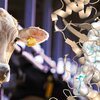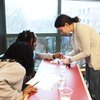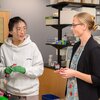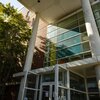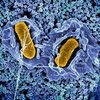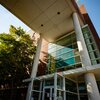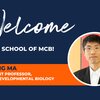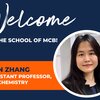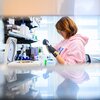2024-02-15
- Chemists have determined for the first time the crystal structure and unlocked the mechanism of reaction activity of a key component of the monensin enzyme.
“The main finding was the first crystal structure for this family of enzymes,” said Chu-Young Kim, a professor of biochemistry at the University of Illinois Urbana-Champaign, who led the experimental side of the study. He and colleagues solved the crystal structure for MonCI, a key enzyme in soil bacteria that naturally synthesizes monensin. Kim...
- 2024-02-12 - What do a synthetic chemist, a medical imaging expert, and a neurologist have in common? They’re coming together in the Biomedical Imaging Center at the Beckman Institute for Advanced Science and Technology to develop better diagnostic tools and imaging agents to detect early-stage Alzheimer’s disease and other neurodegenerative diseases. A team led by Liviu M. Mirica along with Wawryzneic “Wawosz” Dobrucki...
- 2024-01-31 - Nicole Godellas recently earned her PhD in Molecular and Integrative Physiology. Along the way, she joined the Beckman Institute’s outreach team and learned a few lessons about communicating science to the general public. I never anticipated joining a communications team during my graduate career. When I was a PhD student in the Department of Molecular and Integrative Physiology, I spent a lot of my time at the bench and in front of my computer. I always expected my journey to be quite...
- 2024-01-23 - Secretory Immunoglobulin A (SIgA), the predominant human mucosal antibody, can bind to bacterial surface proteins and trigger an immune response to improve infection outcomes, but these interactions are poorly understood. In a new study, University of Illinois researchers found distinct host-pathogen interaction through unexpected binding of SIgA, the pathogen streptococcus M4, and CD89, an immune cell receptor. Group A streptococcus (GAS)...
- 2024-01-16 - Eight alumni of the University of Illinois College of Liberal Arts & Sciences, including two with ties to the School of Molecular & Cellular Biology, will receive recognition during the college’s 2024 alumni awards at a celebration in April. They are researchers and entrepreneurs who have made incredible impacts in their fields and communities. LAS Alumni Achievement Award Lisa Monteggia (BS, ‘89, microbiology; MS, ’91, biology) Lisa Monteggia is an internationally recognized leader in...
- 2024-01-12 - Nine University of Illinois Urbana-Champaign faculty members, including microbiology professor James Imlay, have been named university endowed chairs or professors, an honor awarded to highly distinguished scholars for their excellence and prominence in research, teaching, and service. James Imlay is an international leader in the field of oxidative stress and his research throughout the last 35 years defines our understanding of oxidative damage...
- 2024-01-05 - Neurodegenerative disorders such as Alzheimer’s disease affect more than 270 million people worldwide. Alheimer's is the leading cause of dementia, resulting in memory loss due to atrophy of neurons in the hippocampus, which is the part of the brain that regulates learning and memory. Nanoparticles designed to carry drugs have emerged as a strategy for treating different diseases, but in the context of neurodegenerative disease, much of the research has focused on developing strategies for getting nanoparticles across the blood brain barrier and into targeted regions of the brain. In a new...
- 2024-01-04 - Salmonella is notorious for surviving and replicating in macrophages, which are normally lethal to invading bacteria because of their inhospitable environment. In a new study, researchers have discovered how a system of proteins, called TamAB, helps Salmonella survive under the harsh conditions inside macrophages. Salmonella is a foodborne pathogen that causes more than a million infections each year in the U.S. Concerningly, it can kill young, old, and immunocompromised individuals. What makes these bacteria especially dangerous is their ability to evade our...
- 2024-01-01 - The School of Molecular & Cellular Biology is proud to welcome six new faculty hires during the 2023-2024 academic year. Get to know our new faculty. Department of Biochemistry Chang Cui, assistant professor of biochemistry Read an interview with Professor Cui Contact Professor Cui Chu-Young Kim, professor of biochemistry...
- 2023-12-14 - The School of Molecular & Cellular Biology and Department of Cell & Developmental Biology are pleased to welcome Haiting Ma as an assistant professor of cell and developmental biology this fall. He join us from the Whitehead Institute for Biomedical Research at Massachusetts Institute of Technology, where he completed his postdoctoral research. We spoke with him about his research and teaching interests and how he spends his time outside the lab...
- 2023-12-14 - The School of MCB is proud to recognize outstanding members of its community at the annual holiday celebration. On Dec. 7, 2023, several faculty and staff were presented awards for their valuable contributions by School of MCB Director Milan Bagchi, Deborah Paul Professor of Molecular & Cellular Biology. Congratulations to this year's winners! Research Excellence Award Jie Chen Teaching Excellence Award Anna Sokac Service Excellence Award Brenda Wilson Most Accomplished SMCB Graduate Student Award Aatiqa Nawaz Most Valuable Undergraduate Instructional Staff Award Shawna Naidu...
- 2023-11-30 - The School of Molecular & Cellular Biology and Department of Biochemistry are pleased to welcome Dr. Yan Zhang as assistant professor of biochemistry. Dr. Zhang joined us in November 2023 from the University of California, San Francisco, where she conducted her postdoctoral research. Tell us about your lab and your research focus, including how you came to choose or specialize in this area. The overarching goal of my research is to uncover the fundamental principles underlying...
- 2023-11-27 - Antibodies—proteins that are produced by our immune system to protect us—are crucial for recognizing and getting rid of unwanted substances, or antigens, in our body. Although their role is universal, antibody structure varies in different animals. In a new study, researchers have analyzed the antibody Immunoglobulin M in rainbow trout to shed light on why these proteins may have evolved over time. In humans, IgM consists of five repeating units that are held together by a joining chain, resulting in a star shape. Consequently, IgM can bind to multiple antigens at the same time, clearing...
- 2023-11-27 - The School of Molecular & Cellular Biology and Department of Microbiology are pleased to welcome Dr. Nkrumah Grant as assistant professor of microbiology. Grant joined us in November 2023 from Michigan State University and the University of Idaho, where he conducted his postdoctoral research. Tell us about your lab and your research focus, including how you came to choose or specialize in this area. My lab combines evolutionary theory, microbiology, molecular genetics, and genomics, to understand...
- 2023-11-21 - Estrogen receptor-positive breast cancer is the most common form of breast cancer, affecting approximately 75 percent of breast cancer patients. In advanced and metastatic form, it is lethal, claiming the lives of nearly 350,000 individuals annually. Presently, no drug is able to eradicate these advanced tumors. University of Illinois Urbana-Champaign researchers Paul Hergenrother and David Shapiro are working to change that with the anticancer compound...
